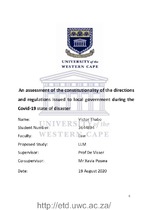An assessment of the constitutionality of the directions and regulations issued to local government during the Covid-19 state of disaster
Abstract
President Cyril Ramaphosa first addressed the nation regarding the Covid-19 pandemic on the 15th of March 2020, when he announced the national state of disaster in terms of the Disaster Management Act (DMA) to prevent the rise of Covid-19 infections.1 On the 23rd of March 2020 in his second address, the President announced a national Lockdown, initially for 21 days, and outlined more stringent interventions to limit the transmission of the coronavirus and to mitigate its economic and social impact.2 Since then, there have been at least four sets of directions issued to the provinces and municipalities in terms of the Disaster Management Act, with the first set of directions to provinces and municipalities taking effect on the 25th of March 2020. The purpose of the directions issued to municipalities were to direct municipalities in respect of the following matters in response to Covid-19 namely, the provision of water and sanitation services, hygiene education, communication, and awareness. For the purposes of this research, the word coronavirus will be used interchangeably with Covid-19.
The first set of directions titled ‘COGTA COVID-19 Disaster Response Directions 2020’ took effect on the 25th of March 2020.3 The directions stipulated that no council meetings outside the District Command Centre meetings may be undertaken during the initial 21 Day Lockdown period, or any other extended period that may be declared. Since then, there have been amendments to these directions. The directions which commenced on the 3rd of July 2020, as far as local governance is concerned, stated that municipalities and municipal entities could convene council meetings.

